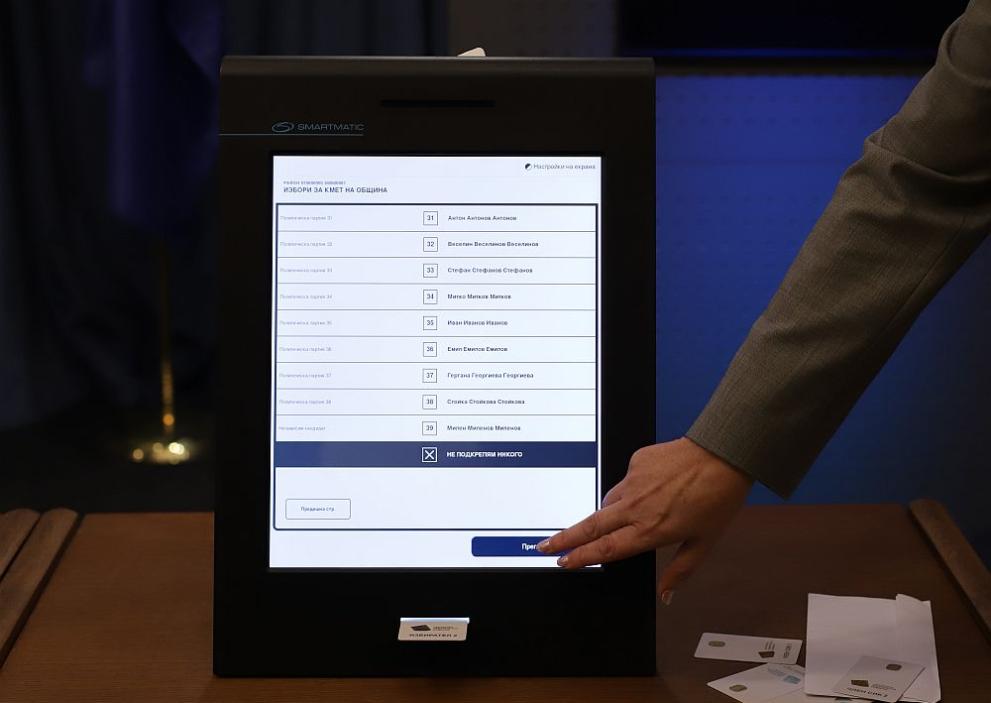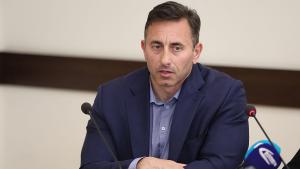The Supreme Administrative Court (SAC) Monday revoked a decision by the Central Election Commission (CEC) that eliminated voting machines from the local elections and returned the machines for the run-off elections on November 5, the Court told BTA.
It says in the reasoning that the part of the CEC decision concerning the November 5 elections, did not comply with the law.
The applications concerning the first round of voting on October 29, were rejected. The Court found that the Elections Code mandates the Minister of Electronic Governance with the certification of the voting machines' compliance with the law and he may not delegate that task to a Deputy Minister, which was the case with the certification of the machines for October 29. The Court also found that there is enough time before the November 5 runoffs for the Minister to fulfill his obligations.
The SAC decision is final.
CEC ordered that voting on October 29 should be with paper ballots only after the State Agency for National Security wrote in a memo to the state institutions that they suspected a security breach after a Deputy Minister of Electronic Governance, Mihail Stoynov, was caught making a video of a compliance test of the machines. The ban on the use of the machines caused an outrage among some voters and political parties, notably the Continue the Change - Democratic Bulgaria coalition, which have always been passionate advocates of machine voting. They were among those who took the matter to the Supreme Administrative Court.
Ten appeals were lodged against the CEC decision in total, by participants in the elections and NGOs.
The appeals
Appellants argued that CEC issued the ban on voting machines arguing that they had not been verified but its order came before the deadline for verification had expired.
Lawyer Vasil Pandov claimed the CEC's decision was invalid and pointed out that the report by the Electronic Governance Ministry, the Bulgarian Institute of Metrology and the Bulgarian Institute of Standardization did not find any non-compliance of the voting machines. CEC could have taken a decision to ban the machines only if such issues were found, he argued.
MP Nadezhda Yoradnova of the power-sharing Democratic Bulgaria, said that the CEC decision was ill-grounded and did not indicate on the basis of which authority it issued the decision to abolish machine voting. She also insisted that SANS, whose report was central to the CEC decision, has no authority to rule in this regard.
CEC Public Council Chair Tsvetelina Peneva said that CEC's decision violated her rights as a voter to choose to vote by machine or by paper ballot. The decision was made on the basis of documents that are irrelevant to the Electoral Code, she stressed.
CEC Spokesperson Rositsa Mateva argued that the actions of Deputy Electronic Governance Minister Stoynov on 25 October were not part of the compliance procedure. According to her, it is not confirmed by the certification authorities that he acted in keeping with a procedure related to the machines. CEC also believes that Stoynov does not have the authority to sign the certification report, Mateva added.
Stoynov rejected those allegations in a statement he put out on Monday.
It says in the reasoning that the part of the CEC decision concerning the November 5 elections, did not comply with the law.
The applications concerning the first round of voting on October 29, were rejected. The Court found that the Elections Code mandates the Minister of Electronic Governance with the certification of the voting machines' compliance with the law and he may not delegate that task to a Deputy Minister, which was the case with the certification of the machines for October 29. The Court also found that there is enough time before the November 5 runoffs for the Minister to fulfill his obligations.
The SAC decision is final.
CEC ordered that voting on October 29 should be with paper ballots only after the State Agency for National Security wrote in a memo to the state institutions that they suspected a security breach after a Deputy Minister of Electronic Governance, Mihail Stoynov, was caught making a video of a compliance test of the machines. The ban on the use of the machines caused an outrage among some voters and political parties, notably the Continue the Change - Democratic Bulgaria coalition, which have always been passionate advocates of machine voting. They were among those who took the matter to the Supreme Administrative Court.
Ten appeals were lodged against the CEC decision in total, by participants in the elections and NGOs.
The appeals
Appellants argued that CEC issued the ban on voting machines arguing that they had not been verified but its order came before the deadline for verification had expired.
Lawyer Vasil Pandov claimed the CEC's decision was invalid and pointed out that the report by the Electronic Governance Ministry, the Bulgarian Institute of Metrology and the Bulgarian Institute of Standardization did not find any non-compliance of the voting machines. CEC could have taken a decision to ban the machines only if such issues were found, he argued.
MP Nadezhda Yoradnova of the power-sharing Democratic Bulgaria, said that the CEC decision was ill-grounded and did not indicate on the basis of which authority it issued the decision to abolish machine voting. She also insisted that SANS, whose report was central to the CEC decision, has no authority to rule in this regard.
CEC Public Council Chair Tsvetelina Peneva said that CEC's decision violated her rights as a voter to choose to vote by machine or by paper ballot. The decision was made on the basis of documents that are irrelevant to the Electoral Code, she stressed.
CEC Spokesperson Rositsa Mateva argued that the actions of Deputy Electronic Governance Minister Stoynov on 25 October were not part of the compliance procedure. According to her, it is not confirmed by the certification authorities that he acted in keeping with a procedure related to the machines. CEC also believes that Stoynov does not have the authority to sign the certification report, Mateva added.
Stoynov rejected those allegations in a statement he put out on Monday.











































